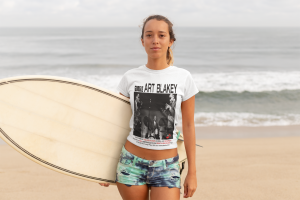Art Blakey
Blakey went on to record dozens of albums with a constantly changing group of Jazz Messengers. He had a policy of encouraging young musicians: as he remarked on-mic during the live session which resulted in the A Night at Birdland albums in 1954: "I'm gonna stay with the youngsters. When these get too old I'll get some younger ones. Keeps the mind active.
After weathering the fusion era in the 1970s, popularity of the Jazz Messengers faded away. But Blakey's band continued performanced with new jazz men such as Terence Blanchard and Kenny Garrett.
He continued performing and touring with the group through the end of the 1980s. Ralph Peterson, Jr. joined in 1983 as a second drummer due to Blakey's failing health. Ron Wynn notes that Blakey had "played with such force and fury that he eventually lost much of his hearing, and at the end of his life, often played strictly by instinct." He stubbornly refused to wear a hearing aid, arguing that it threw his timing off, so most of the time he played by sensing vibrations. Javon Jackson, who played in Blakey's final lineup, claimed that he exaggerated the extent of his hearing loss. "In my opinion, his deafness was a little exaggerated, and it was exaggerated by him. He didn't hear well out of one ear, but he could hear just fine out the other one. He could hear you just fine when you played something badly and he was quick to say 'Hey, you missed that there.' But anything like 'I don't think I'll be available for the next gig', he'd say 'Huh? I can't hear you.'" Another bandmate, Geoffrey Keezer, claimed that 'He was selectively deaf. He'd go deaf when you asked him about money, but if it was real quiet and you talked to him one-on-one, then he could hear you just fine.






































